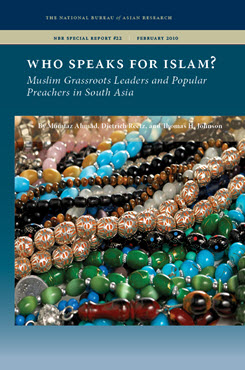Religious Figures, Insurgency, and Jihad in Southern Afghanistan
This essay examines the social and political roles of religious figures in southern Afghanistan in an attempt to develop a more nuanced understanding of the present insurgency.
EXECUTIVE SUMMARY
This essay examines the social and political roles of religious figures in southern Afghanistan in an attempt to develop a more nuanced understanding of the present insurgency.
MAIN FINDINGS
- Islamic groups and Afghan mullahs play a critical role in politics in southern Afghanistan. The Taliban, Deobandis, Sufis, and Tablighi Jamaat are the most important religious groups and influences in southern Afghanistan.
- Religion and politics are blurred as religious authorities frequently shift between religious and political roles. The West has had a tendency to misunderstand the relevance and implications of these roles.
- Jihad is an important feature of Islamic life in southern Afghanistan. Large numbers of southern insurgents are waging jihad for the implementation of sharia (Islamic law). Several predominant religious figures and influences tend to advocate jihad. The West has underestimated the role of jihad in the present Taliban movement.
- The ulema council in southern Afghanistan represents a sector of the clergy that has remained relatively un-radicalized by war. Insurgents and jihadists have frequently assassinated members of this council because it offers legitimate opposition to the Taliban’s radicalization of young madrasah students and unemployed villagers.
- The political activities of two Islamic groups that represent a large number of rural and poor Afghans are misunderstood. Some Sufi groups in Kandahar have allied with insurgents since 2003 and have promoted rural resistance to secular authority. The Tablighi Jamaat, though avowedly apolitical and detached from the insurgency, has a relationship with the mujahedeen who regularly attend this group’s meetings.
POLICY IMPLICATIONS
- Political and military strategies aimed at countering the Taliban insurgency while ignoring the Taliban jihad are ill-founded and will probably not succeed.
- Currently there is very little contact between NATO or ISAF and the ulema of southern Afghanistan. Rather than stereotype all religious leaders and institutions as militant fundamentalist, policies that incorporate certain religious groups into civil society should be considered.
- There is a critical need to fix the corrupt justice system in Afghanistan. A central component of the Taliban’s strategy to win the trust and confidence of the Afghan population is based on the role of Taliban mullahs as arbitrators of individual and community disputes. This “shadow” justice system is proving very popular.


